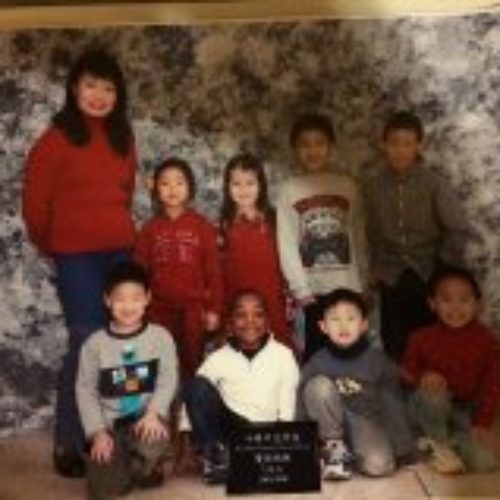Today I start my new blog.
This is a story about how I will teach leadership and speak about my personal journey in China and the US. I have declared it now to friends on social media, and to a zillion other people to keep me honest and accountable. It is a sweet tale about how one woman boldly stepped out into the unknown, and formed a new life ‘on purpose.’ It is also a story about how one person can change the trajectory of another’s journey. I am taking a big leap. I feel like my life is being turned upside down and back again. And, I’m noticing a curious calmness in me. Yikes! Hold up though. Let me start from the beginning.
My Formative Years – Race Matters
My formative years were – for the most part – nurturing, full of play, and fun. I was fortunate to grow up in a simple, middle class neighborhood, in a house next to a sprawling wood at a time when it was still safe to explore. I loved to stare into space and imagine what might be behind those clouds. I loved to create stories for my dolls on a white do-it-yourself bookshelf that covered an entire wall of my small bedroom. That was my time. When I was out in the world though, I often felt like an outsider. One reason was that although I am African-American, I never felt fully connected to the African-American community. I didn’t have many African-American friends; most of the activities I participated in were predominately White; the church we attended was almost entirely White; my high school had about 500 students, and among them, I think five were African-American. I get the feeling that in some other countries, this isn’t significant. However, in the United States, whether we admit to it or not, it is a big deal because race is so much a part of our DNA, our language, our references, and our history. And so, as I was forming my identity, I felt that something central was missing. It was like I was carrying around an ever-expanding emptiness, and that was painful for me.
Lord’s Spring Moon
It wasn’t until college that I decided to do something to begin to fill the emptiness. At that time, I started reading a lot of African-American literature. It was like I was trying to catch up and re-connect with my cultural history and consciousness. By graduate school, I was reading African-American historical novels of generations of women. A friend of mine, Arlene, a voracious reader, recommended ‘Spring Moon’ by Bette Bao Lord. I had always admired Arlene’s taste in books, and was excited to take a brief respite from my current ‘reading phase’ to read this book about different generations of women in China.
How can I describe the visceral experience I had reading this book? The cultural experience of generations of Chinese women (from traditional China, The Cultural Revolution and modern-day China) produced women with vastly different perspectives. Their divergent perspectives reminded me of divergent perspectives across generations of African-American women. Lord’s writing style was effortless, and romantic. The allegory was vivid. The women were powerful and clear about themselves in service of the next generation of women. I was completely enraptured. Then it dawned on me. I was having the exact same experience I had with the historical novels of African-American women. And, I had the same sort of reverie after I finished the book. This freaked me out for months! I don’t know if I was connecting to the generations of women, or their power, or something else. I do know that I had been convinced that my love of African-American historical novels was about reconnecting with my ethnic identity. As it turned out, my ethnic identity had nothing, or very little to do with my reading experience.
Journey to China
I was working as a graduate assistant in a center that, among other objectives, was charged with arranging international exchanges. I helped create and coordinate opportunities for American students to study abroad, and for international students to study at my university. One day, the executive director came into my office and asked me if I would ever like to go on one of these programs at the center’s (partial) expense. Almost before he could finish his sentence, I said, “Yes! I want to go to China.” And just like that, I was on my way.
During that first trip, I joined other American students through a program at George Mason University, and visited many Chinese cities. We visited businesses and Chinese universities for mini-lectures across the country. I had a ball. I had been far away from home before (I had traveled in Europe and had worked briefly in the Middle East), but this was different. This trip felt more like an adventure. It wasn’t until our bus ride back to the airport that the George Mason professor in charge asked me how I enjoyed the trip. We chatted about the Chinese language and culture. He talked about his pet peeve – the way some people pronounced “Beijing.” It irked him when people muddied the ‘j’ instead of articulating a clear ‘j’ as in ‘jingle bells.’ We had a few chuckles about that. I shared that I had learned a few phrases in Mandarin and had learned to count to 10. I found myself saying out loud, “Wouldn’t it be cool if I actually learned Mandarin.” Then – and I distinctly remember this – he turned to me and got serious. He said that if I had any interest in Mandarin, I should pursue it. I remember the electricity in that moment, and giving the idea of fluency more than a passing thought. We chatted a bit more, and then I intentionally walked over to a seat in the bus and sat down. I remember falling into my own little fantasy world, imagining what fluency in Mandarin might be like. At the time, fluency seemed awesome and overwhelming. I needed time to step away and process that idea. And so, for a few precious moments, I did process the idea, and then I let it go.
Six months later, my interest in Mandarin re-emerged and I was researching language immersion programs. The program I decided I wanted to attend was called, “Princeton in Beijing,” a highly selective program and intensive language immersion experience through Beijing Normal University. It took me forever to finish the application, but finally I sent the thing in and was accepted! I was convinced that this was the beginning of a life change. The summer program was three months long, and I decided to make the most of this care-free time. I would figure out how to stay longer. I applied and was accepted into a separate fall exchange program at Hong Kong University of Science and Technology. I went from department to department of my graduate school, starting with the business school, to raise money for the stay in Hong Kong. I offered to speak to prospective students scheduled to come to graduate school during the next school year. I would tell them what they would need, give them a sense of the campus, talk about campus life, and answer their questions. I would also meet up with them after they arrived in summer/fall. Several departments sponsored me and I couldn’t have been more excited. I also spoke to the administration of my department. They believed in me and also offered some financial support. I then found a professor in my department and a professor in Hong Kong who agreed to jointly advise me on a paper about financial markets in China. I arranged to get credit for the paper toward my degree, and began telling friends who had all arranged fancy internships with big companies what I was up to. This was the first time I heard anyone say that I was ‘resourceful.’ That was Nitin Bhargava. He said it in a way that somehow communicated a respect for my efforts and me in that moment. It was a new strength to actively explore, and I did so for years afterwards.
My boyfriend (now husband) took me to the airport for the big trip. I cried and cried. It felt like such a tragedy to leave him for the summer and fall (7 months!). I still had the heart and spirit of a young girl floating in her first love. But I did get on the plane and began to wonder what this far away experience would be like. At Beijing Normal University, I lived in dorms with other undergraduate and graduate students from around the world studying Mandarin. It was exhilarating. As I remember, my tones were quite good, and I had no trouble memorizing long passages (15 years of piano finally paid off thank you!), but I just wasn’t prepared for the accelerated academic pace of the curriculum. I made some great friends, took some cool trips, ate some awesome food, and decided to skip the final exam.
Now to Hong Kong
I then traveled to Hong Kong. I studied Mandarin while I was there as well, although almost everyone spoke Cantonese or English. In the university library, I found all kinds of books on China that I would never have access to in the United States. I took three classes and signed up for an independent study (This involved writing the paper on financial markets in China with one professor from the US, and one from the Hong Kong University of Science and Technology).
One thing that surprised me about my stay in China and Hong Kong was how lonely I felt. Looking back, I think I wasn’t fully comfortable in my own skin, not yet confident in my own identity, and here I was in this place where people were constantly staring at me. Some people even seemed to be horrified by the sight of me. And at the same time, I had forged some very close relationships and was grateful for the connectedness. I had an intense desire to stay, to experience more and learn more, and simultaneously had an overwhelming feeling of not being able to stand being away from home for another minute. It was a pretty heady time for me. I finished up the semester, watched the handover of Hong Kong from England back to China, and headed for home.
Back in the United States
It wasn’t difficult to readjust to my life in the United States. By then, my former boyfriend, now fiancé had rented a small house in another state, and I suddenly was living in what felt like a lot of space. I hired a tutor through my new company’s ‘employee scholar program,’ but I just didn’t have the Chinese language environment to keep my Mandarin up. Over the next ten years, even without language skills, I tried to maintain my connection with China. And, as many other mothers, after having children, I diverted almost all of my focus and efforts toward raising a family.
A Woman’s Adventure
Looking back, I realize that as a young woman, my experience of China was a child’s adventure, full of idealism and dreaming, excitement and exploration. It was an important piece of my journey, and I received what I could at that age, and at that stage of my adult development. Now, as a women of middle-age, I am able to take in more of the complexity that lives in my adventure with China.
To be candid, my Chinese language journey is a long-term journey. It will require a very different level of focus, prioritizing, and emotional stamina. I willingly accept all this as part of the process. Now that I am committed, companies that I have a relationship with, particularly focused on transformational leadership, have expressed interest in my journey. All I can say about that is, “Wow!” What I often feel these days is total panic, overwhelm, pride, a sense of being ‘on purpose’ and a lovely buzz in my daily routine. I am constantly shifting my perspective back to one that is healthy and productive. I am intentionally staying tethered to my ‘leadership stake’ and trying to stay committed to a daily health routine that will support me as I navigate my new adventure. My kids are excited for me. They respect my space and time when I’m immersed in my studies, and I’ve made surprisingly deep relationships with some of my language partners I’ve known for only a season. It’s a wonderfully complicated, frustrating, self-actualizing experience that makes me feel like I am playing my bigger game.
Again, thanks for joining me in the beginning of my adventure.
Signing off for now,
Warmly, Vernice
Send me an email to subscribe to this blog: [email protected]
P.S. My next blog will detail my son’s experience in Chinese school and my work opportunity in Shanghai.





